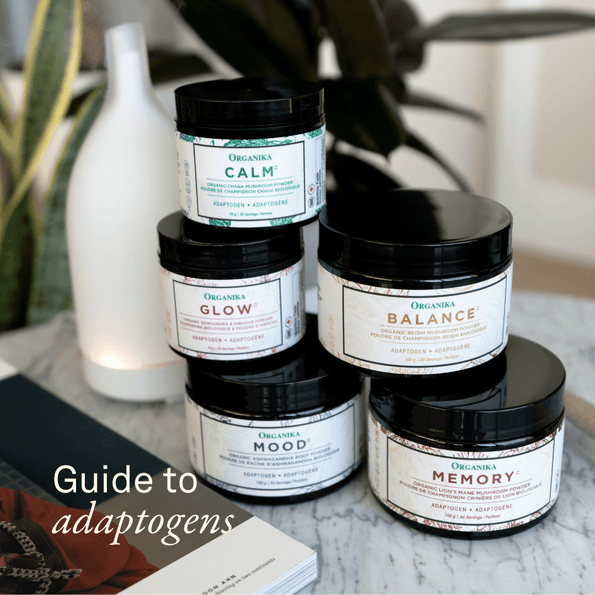Ever feel off kilter or out of balance? Not 100%? In the past year, that has been true for most of us, most of the time! Between an uncertain world, a never-ending to-do list, and our own expectations, it’s challenging to feel on top of things – let alone relaxed and rested.
What if there was something to help your body and mind to better cope with the stresses of life? Luckily, adaptogens might just be for you! Let’s dive into this peculiar class of plants and how it can benefit your daily life.
Shop Adaptogens
What are adaptogens?
‘Adaptogen’ is the term for the plants, herbs and mushrooms that help our bodies to adapt or adjust to the challenges life throws at us. Stress can cause one or more systems in our bodies to overwork or under-function, and if we can’t adapt to or handle chronic stress, we increase the risk of disease. Adaptogens help to bring the body into balance, whichever way it’s required, and allow us to feel better.

Can I use adaptogens for stress?
Our central nervous system (CNS) works to control and influence activity in all parts of our body. As it receives information and passes along commands, its goal is to keep us as safe as possible.
One of the systems the CNS controls is called the hypothalamus-pituitary-adrenal (HPA) axis. This system of glands and hormones directly affects outcomes like our response to stress levels as well as blood sugar, inflammation, and immune reactions.
Adaptogens work by affecting and regulating the CNS and the HPA axis. This means they can actually help to prevent and reverse the effects of too many stressors.
Are adaptogens safe?
Yes, adaptogens are safe at standard doses for most people. Like anything, how you react specifically may be different than another person. If you experience any undesirable side effects, stop taking the products immediately. Consult with your medical professional if you are pregnant or breast-feeding, on medication, or have an upcoming surgery.

Reishi mushroom
Reishi mushrooms, or Ganoderma lucidum, help to balance many body systems. Used for at least four thousand years in many Asian countries for its medicinal properties, countless modern scientific studies prove what our ancestors put into practice.
Reishi mushroom benefits
- Calm the body and mind. By improving the health of adrenal glands, where cortisol and other stress hormones are produced, reishi may help reduce anxiety, nervousness, and muscle tension.
- Modulate the immune system. Reishi improves immune function to protect the body more optimally from viruses, bacteria and cancer cells. It is also shown to be beneficial to an overactive immune system, with autoimmune challenges, allergies, and sensitivities.
Shop Balance reishi powder

Lion’s Mane mushroom
Lion’s Mane mushroom, latin name Hericium, is a white spongy-looking edible mushroom that tastes a bit like shrimp or lobster when cooked. It is generally known for its role in improving memory and brain function.
Lion’s mane benefits
- Protect and regenerate nerve cells. Lion’s mane induces nerve growth factor (NGF), required by the brain and neurons for development and maintenance.
- Modulate our gut immune system. This can positively affect inflammation and microbes in the digestive system.
Shop Memory lion's mane powder

Chaga mushroom
Chaga mushrooms, or Inonotus obliquus, is a fungus naturally found growing on the outside of birch trees in very cold climates. Very hard, it usually requires an axe or saw to harvest.
Chaga mushroom benefits
- Extremely high antioxidant content. This helps combat free radicals and damage caused by all types of stress on the body.
- Decreasing effects on anxiety and overwhelming feelings. The high levels of antioxidants allow us to handle stress more effectively.
Shop Calm chaga powder

Ashwagandha root
Ashwagandha, known as Withania somnifera or Indian Ginseng, is a root commonly used in Ayurvedic traditional medicine.
Ashwagandha benefits
- Help balance our mood and increase a feeling of happiness. It has a positive effect on the thyroid, which controls many of our emotional hormones.
- Normalize weight and food cravings. This positive benefit stems from its thyroid balancing properties.
Shop Mood ashwagandha powder

Tremella mushroom
Tremella fuciformis is also known as snow mushroom, silver ear or white jelly mushroom. It is particularly popular in East Asia, where it has long been used as part of the cuisine and medicine.
Tremella mushroom benefits
- High moisture retention. Tremella has an extreme water holding capacity, comparable to that of hyaluronic acid, a common ingredient in skincare products. Increased moisture retention provides a plump, healthy and youthful look to complexion, decreasing signs of dryness and aging.
- Immune function support. Tremella polysaccharides (naturally occurring long chains of carbohydrate molecules) have fantastic immunomodulatory properties. Immunomodulators help adjust the immune system to your circumstances and needs, to help your body adapt and fight off stressors.
Shop Glow tremella powder

Article written by
Organika Health
Love learning about this stuff?
Get expert-backed health tips, education, product news, and exclusive offers delivered to your inbox.
